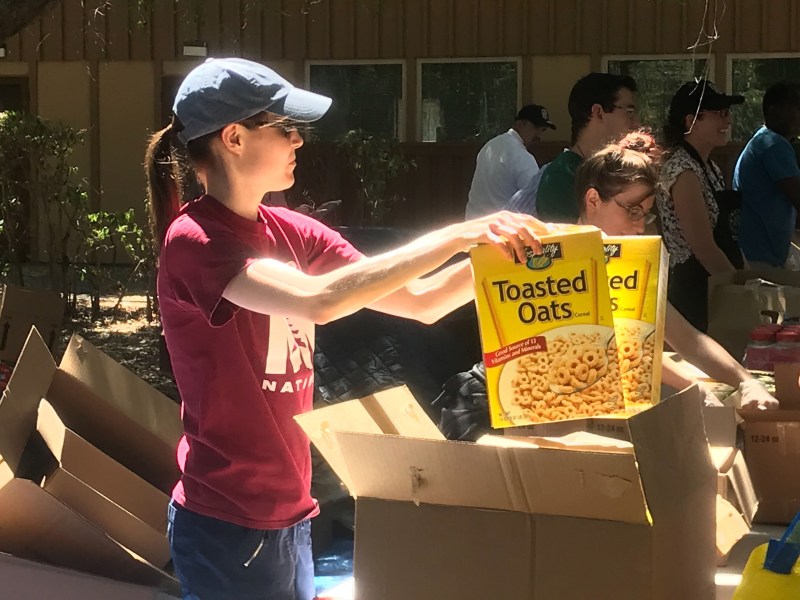The second Stanford pop-up food bank provided food to 197 families on Sept. 23, marking the growing momentum of the student-led push to alleviate food insecurity on campus. The initiative is a collaboration between Second Harvest Food Bank of Silicon Valley, Stanford Residential & Dining Enterprises (R&DE), the Graduate Student Council (GSC), the Associated Students of Stanford University (ASSU) and Stanford Solidarity Network (SSN).
That event marked the second pop-up food bank in a series of three pilot events, the first of which took place on Aug. 26. After seeing success, the pilot has been extended to future events on Oct. 28, Nov. 20 and Dec. 3.
At each event, the participating families each receive up to 150 pounds of food.
“For October, we’re hoping more people will show up, and we want to try and target over 350 students,” Second Harvest partnership manager Luz Ayala said.
Eventually, Ayala said, the program has plans to create a location on campus to increase the convenience of the program. Additionally, starting in October or November, Ayala hopes the program will increase distribution from once to twice a month, since the food distributed usually lasts no more than two weeks.
The combination of skyrocketing prices in Palo Alto and the low earnings of graduate students at Stanford has left many unable to afford healthcare, insurance and even food for themselves and their families. Efforts to establish a robust on-campus food pantry began last year, following a February Daily article about graduate students foraging for food from campus trees to feed their families.
“I think people are starting to realize and notice that college hunger is high right now, and people are feeling more comfortable reaching out for food resources,” Ayala said. “I feel [that Stanford] is very dedicated to helping their students not have to decide between a book or groceries, or a bill or groceries.”
While the Aug. 26 delivery date had relatively few attendees because it occurred during the summer quarter, the Sept. 23 pilot had a higher volume of families on campus, said Irán Román, a sixth-year Ph.D. student, SSN member and ASSU Co-Director of Affordability.
“I had some new neighbors who didn’t know about the program and when I started sharing the story about this program existing, they very quickly became interested and they attended the program,” Román told The Daily.
Román also pointed to more individuals who were proactive about taking advantage of the second pilot. “I was getting phone calls from neighbors who were either running an errand or going to the airport and they were asking me, ‘Hey, can you please go and get food for me?’ and that’s what I did,” he said.
The program has also helped raise awareness surrounding campus food insecurity, Román explained. “I think that you know, it’s gone public and this program has become something that is kind of part of a celebration and kind of a place with no stigma to go and get food if you need it.”
Bolivar Hope, a parent and husband of Karla Prudencio, an international Stanford Law School student, took advantage of the food pantry in September.
“It was very helpful,” Hope said. “At least for us, they give us a lot of food that works perfectly with our traditional dish.”
Hope used the pantry as an opportunity to connect with others. “In the line to get the pantry I talk with a Peruvian friend and both agree that here, in the U.S., we’re closer to the poverty line than in our countries,” he said.
But every small step is progress. “It’s helping, of course,” Hope continued. “It’s not going to solve the bottom of the problem, but at least you have enough food for one week.”
Román still feels more steps can be taken to improve the food pantry pilot.
“One main feedback for improvement that I’ve been hearing is [that we need] the ability to get more protein-rich foods compared to just vegetables or fruits,” he said.
Thus far, the food bank pilot has helped address some of the food insecurity among graduate students. The next question is whether it is sustainable as a full-time program at Stanford.
Many of Stanford’s peer institutions have already established food pantries to provide immediate food assistance to students. The UC Berkeley Food Pantry celebrated its fifth anniversary this year, and other California universities including UC Irvine and UCLA have expanded food pantry programs as part of the UC Global Food Initiative. Other universities including Northwestern and Columbia have food pantries that are open weekly or even more frequently.
R&DE did not respond to The Daily’s repeated requests for comment.
“From our side, we will keep pushing for [the program] to continue,” Román said. “But I actually think that if it continues existing, it tells a signaling of a very sad part of this story, which is the fact that it is unaffordable to live on Stanford’s campus as graduate students with the wages that Stanford pays us.”
Román told The Daily that the more ideal solution would be for Stanford to expand graduate students’ wages to living wages that cover food, healthcare and childcare without requiring outside programs like Second Harvest to get by. He explained that he knows families who have been relying on public programs like CalFresh and Special Supplemental Nutrition Program for Women, Infants, and Children (WIC) for as long as he’s been on campus.
“The University has to step up and really solve this problem, not just the symptoms,” Román said. “This program will be successful when it is no longer needed because everyone can thrive financially and nutritionally at Stanford.”
Contact Esha Dhawan at edhawan ‘at’ stanford.edu and Kate Selig at kkselig23 ‘at’ stanford.edu.
